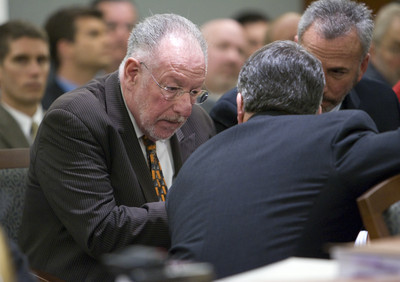Goodman calls Culinary ‘evil’
The Culinary union's leadership is "evil," Las Vegas Mayor Oscar Goodman said Wednesday, adding to the already heated rhetoric in the feud between the union and the city of Las Vegas over downtown redevelopment and a proposed new city hall.
His comments came after a lengthy court hearing over whether the city has to put two ballot measures before voters in the June 2 municipal elections.
No rulings were made Wednesday. Testimony continues at 1 p.m. today, and Goodman said he will try to be on hand to testify.
Attorneys spent most of Wednesday's session dissecting whether one of the ballot measures violated the "one subject" rule.
The back-and-forth outside the courtroom was considerably less dry.
Goodman, as he has previously said, contends the Culinary union is using fake opposition to downtown projects to pressure the city to help the union get labor concessions from companies that want to build or operate casinos in downtown Las Vegas.
"It's a sin. They are evil," he said. "Their leadership, I believe, is breaching their fiduciary duty and trying to preclude jobs from being developed.
"There is no question in my mind that the Culinary tried to extort the city. This has nothing at all to do with the city hall."
Yes, it does, countered Richard McCracken, the attorney representing the Las Vegas Taxpayer Accountability Committee, a group formed by Culinary to promote the two ballot measures.
The city shouldn't be borrowing money to build a $150 million to $267 million building in such bad economic times, union representatives have argued.
They've also been critical of incentives and subsidies developers have received for projects within the redevelopment area, which is defined as a blighted area in need of special help to spur investment.
"This is about big chunks of tax money," McCracken said. "This is not a time when the City Council should be given carte blanche, free rein, to spend whatever they want."
One of the ballot measures would ask voters to repeal the existing redevelopment plan.
Testimony Wednesday focused on the other measure, though -- an initiative called the Las Vegas Taxpayer Accountability Act.
If eventually approved by voters, the initiative would require voter approval for any appropriation of $2 million or more to meet the obligations of a lease-purchase agreement, which is the financing method being considered for the proposed new city hall.
It would also give to voters, and only to voters, the power to create and amend redevelopment plans, authority that's now vested in the Las Vegas City Council.
The city's position is that those are two distinct proposals and cannot be together on one initiative petition.
"Do they involve different subject matters?" asked Dan Polsenberg, an attorney representing the city.
"In my opinion, they do," said City Attorney Brad Jerbic, who was on the witness stand. It was Jerbic who advised the City Council not to put the measures on the ballot.
In their lawyerly way, Jerbic and Polsenberg outlined the differences in two parts of the initiative.
For instance, one part concerns lease-purchase agreements generally, not just those with the Redevelopment Agency, which administers the redevelopment program. The other part is about who's in charge of changes to the redevelopment plan.
Also, the first part would apply directly to the city hall proposal, while the second is about the redevelopment plan generally, although Jerbic conceded that there could be a "collateral" effect on the proposed city hall.
In cross examination, McCracken tried to establish connections between the two sections. They both involve spending tax money, for example, and he pressed Jerbic -- mostly unsuccessfully -- to say that changing the governance of the redevelopment agency could affect a contract to build a new city hall.
Contact reporter Alan Choate at achoate@reviewjournal.com or 702-229-6435.
Audio slideshow


















